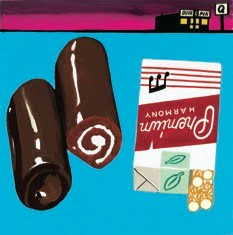Tuesday, August 31, 2010
Countdown: The Top 20 Stephen King Works of American Gothic Short Fiction--#16. Premium Harmony
#16. "Premium Harmony"
[For previous entries, click the "Top 20 Countdowns" label under Features in the sidebar]
Note: King's short story was published in The New Yorker in November 2009. Those unfamiliar with it might want to read it first before proceeding with this blog post.
A decade together has drained the magic from Ray and Mary Burkett's marriage. Argument is now their primary form of communication, as seen on their drive through the economically-depressed town of Castle Rock. They are headed over to the Wal-Mart to buy some grass seed (King stocks the story with calculatedly banal detail) when Mary insists they stop off at the Quik-Pik so she can purchase a purple kickball for her niece. Tempers flare when Mary balks at buying Ray a pack of cigarettes; he proceeds to taunt her about her weight and her fondness for snack cakes. As the first scene closes, King brilliantly illustrates the petty animosity that results from a long life with a so-called loved one: Ray has "parked too close to the concrete cube of a building and she has to sidle until she's past the trunk of the car, and he knows she knows he's looking at her, seeing how she's now so big she has to sidle. He knows she thinks he parked close to the building on purpose, to make her sidle, and maybe he did."
Ray waits in the car with the family dog Biznezz, but is summoned inside by a worker minutes later after the thirty-five-year-old Mary drops dead of a heart attack. The scene inside the Quik-Pik is painted with blackly comic strokes, as Mary lies sprawled next to a kickball-filled wire rack whose sign proclaims "Hot Fun In the Summertime," and as the store manager Mr. Ghosh offers to drape a souvenir T-shirt ("My Parents Were Treated Like Royalty in Castle Rock and All I Got Was This Lousy Tee-Shirt") over Mary's face. Ray hardly comes across as a nobleman here; his thoughts are in turn lascivious (he speculates that if he returned to the store next week, the counter girl would "toss him a mercy fuck"), racist (he isn't thrilled by the idea of the dark-skinned Mr. Ghosh performing artificial respiration on Mary), and insensitive (he believes a woman standing there holding a bag of Bugles should be the one lying on the floor, since she's even fatter than Mary).
Basking in his "celebrity" status as a sudden widower, Ray lingers in the store after the ambulance leaves with his wife's body. He drinks soda, eats some Bugles, and converses with the other customers and the store employees before finally disembarking. Returning to his car nearly two hours after first pulling up at the Quick-Pik, Ray is greeted by another corpse: the forgotten Biznezz is now lying belly-up in the backseat, killed by the sweltering heat. "Great sadness and amusement sweep over [Ray] as he looks at the baked Jack Russell"; he starts to cry and bemoans his double loss, but he might just be going through the motions (he thinks that "[i]t's a relief to sound just right for the situation"). Ray's mixed reaction here in the conclusion underscores the ambivalence that lies at the heart of King's understated story. The reader is left to ponder: is Ray simply contemptible, or just a common man, humanly flawed? That unsettling second possibility is what transforms "Premium Harmony" into an intriguing work of American Gothic fiction.
Labels:
Top 20 Countdowns
Subscribe to:
Post Comments (Atom)

No comments:
Post a Comment